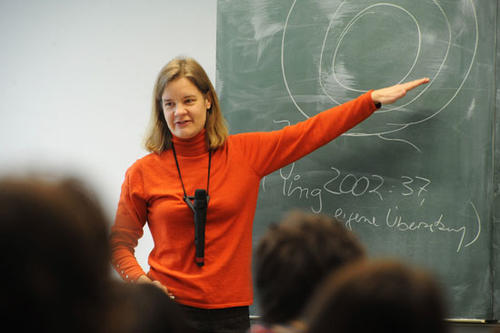Miranda Schreurs of Freie Universität Berlin Named New Chairperson of the EEAC
The director of the Environmental Policy Research Centre (FFU) now also leads the European Environment and Sustainable Development Advisory Councils.
Feb 02, 2011
Professor Miranda Schreurs, director of the Environmental Policy Research Centre (FFU) at Freie Universität Berlin, is the new chair of the European Environment and Sustainable Development Advisory Councils (EEAC).
Image Credit: David Ausserhofer
The European Environment and Sustainable Development Advisory Councils (EEAC), founded in 1993, is an umbrella organization of 30 environmental and sustainability councils from 16 European countries, each of them chosen by its specific government as an independent advisory council from the fields of academia, science, and society. Campus.leben spoke with Professor Miranda Schreurs about her new job as chairperson of the EEAC.
Why was the EEAC, the network of environmental and sustainability councils, founded?
The European Environment and Sustainable Development Advisory Councils (EEAC) was founded in the early 1990s, after the Rio Conference. Since many environmental policy problems are not just country-specific, but international in nature, the European level is important. The EEAC serves as a forum for the exchange of opinions and experiences between the national councils on selected topics.
(In June 1992, Agenda 21 was adopted at the Earth Summit in Rio de Janeiro. It was the first international convention to designate climate change as a serious problem, and it created an obligation on the part of the community of nations to take action. Agenda 21 forms the framework for the climate protection negotiations that take place within the conferences between the nations that signed the convention.–Ed.)
What is the makeup of the EEAC?
The EEAC is a network of the national councils, which make recommendations to policymakers and support them when drafting legislation. The councils are made up of scientists, academics, representatives of civil society and industry associations, and experts.
What are the other tasks of the EEAC?
The EEAC also serves a “watchdog” function, monitoring sitting governments and the European Commission with regard to their decisions on climate policy and their sustainability strategies. One of the EEAC’s biggest projects is to organize an annual conference, which is always held in a different country and with the support of that country’s government. This year it is Poland’s turn; the conference will be held in September.
Does the network influence European policy?
I think the situation is similar to that of most academic and scientific bodies that serve in an advisory capacity: They don’t have any direct influence, but you know that the council’s opinion is heard during development and decision-making processes. Take energy issues, for instance: The EEAC was one of the five or six organizations that published a report at the same time stating that it is necessary to arrive at a CO2-neutral electricity sector based on renewable energies.
Does the EEAC, as an environmental policy board, also want to act as a counterweight to the United States and Japan?
No, not really. We report more on the status of the work done by the academic and scientific councils that belong to the EEAC. At the European level, we make appearances in Brussels, invite members of the European Parliament or the Commission to events, and present the work done by the councils. We maintain an office in Brussels, and we publish a regular newsletter with information on what is happening in the different countries. The EEAC also advises the councils of the new EU member states, such as Poland and Hungary.
You were the vice chair of the EEAC for the past two years. What will change as a result of your taking on this leadership role?
One of the chairperson’s main jobs is to set topics, which means that we determine the areas of emphasis for our term in office. After the conference in Poland, one major topic will be “Rio+20,” with an eye to the U.N. climate conference coming up in 2012 and looking back at the Rio Conference in 1992. The chairperson is also in charge of coordinating the various working groups: There is one group each on energy issues, protecting the oceans, agricultural policy, protecting biodiversity, and sustainability policy.
What does your new job mean to you, and how important will it be to you?
I’m looking forward to an exciting two years. It will be important to set topics and raise the profile of the good ideas generated in the national councils more at the European level. This will be interesting for Germany, because we will have the opportunity to showcase what we can do here at the national level.
Will you need to travel often?
Thanks to new technology, I will be able to do a lot of things right from my own desk, whether through Skype conferences or conference calls, but I will probably also have to travel a bit more often. After all, you do have to stay in touch with other EEAC members. Next week, for example, there is a meeting of the EEAC leadership, meaning about ten to twelve members of different councils. But much of what I will be doing in my new position is closely connected with my work for the German Advisory Council on the Environment (SRU). (Schreurs was appointed to the SRU in 2008.–Ed.)
Further Information
Prof. Miranda Schreurs, Environmental Policy Research Centre (FFU)
Tel.: +49 (0)30 / 838-56687, Tel. (secr.): +49 (0)30 / 838-56654
Email: Miranda.Schreurs@fu-berlin.de

